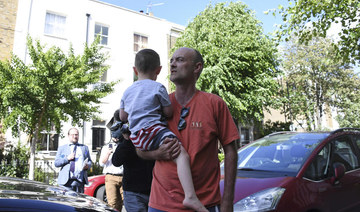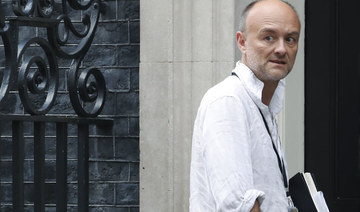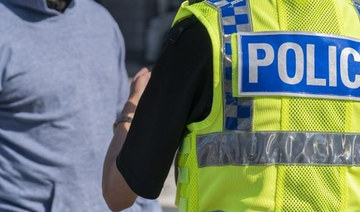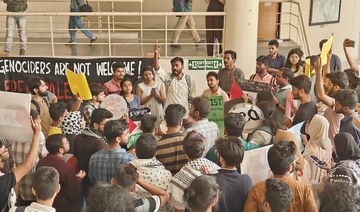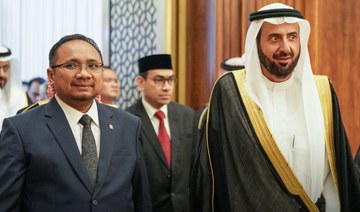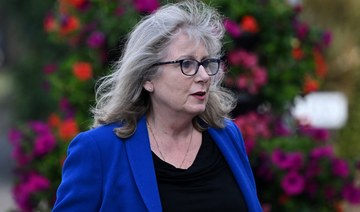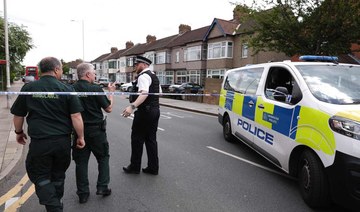LONDON: Dominic Cummings helped Boris Johnson win power by pitting the people against the elite. Johnson’s Conservative administration has branded itself “the People’s Government.”
The prime minister’s populist appeal has been hammered by news that, as the coronavirus outbreak raged, chief adviser Cummings drove 250 miles (400 kilometers) to his parents’ house while he was falling ill with suspected COVID-19 — allegedly flouting lockdown rules that the government had imposed on the rest of the country.
Cummings says he traveled to the family farm in northeast England so that his nieces could care for his 4-year-old son if he and his wife both became sick. But that explanation cut little ice with many Britons, who say they have endured isolation, anxiety and sometimes loss in order to follow government advice to “Stay Home ... Save Lives.”
On Tuesday, junior Scotland minister Douglas Ross quit Johnson’s Conservative government, saying “the vast majority of people” didn’t agree with Cummings’ action.
“I have constituents who didn’t get to say goodbye to loved ones; families who could not mourn together; people who didn’t visit sick relatives because they followed the guidance of the government,” Ross wrote in a resignation letter. “I cannot in good faith tell them they were all wrong and one senior adviser to the government was right.”
Johnson, however, appears determined to hang onto an aide who has been dubbed “Boris’ brain,” even if it fractures his government and erodes Britain’s response to the pandemic.
Arguably, Johnson owes his job to Cummings, a self-styled disrupter who disdains the political establishment and slouches through the halls of government in sweatpants and T-shirts.
In 2016, Cummings honed populist messages that helped the “leave” campaign, co-led by Johnson, win Britain’s EU membership referendum. He is credited with coming up with the campaign’s powerfully simple slogan: “Take back control.” He also hired a firm linked to Cambridge Analytica, which detractors say unleashed the poison of data-harvesting and social-media manipulation into the British political bloodstream.
A TV drama about the referendum, “Brexit: The Uncivil War,” made Cummings the central character, played by “Sherlock” star Benedict Cumberbatch.
When Johnson became prime minister in July 2019 after interminable battles over Brexit defeated his predecessor Theresa May, he hired Cummings as his right-hand man. In December, Johnson won a commanding majority in Parliament with a ruthlessly focused election campaign and another simple slogan: “Get Brexit done.”
Johnson, who was sick with COVID-19 around the same time as Cummings and spent three nights in intensive care, has backed his adviser, saying Cummings “followed the instincts of every father and every parent.”
Cummings denies breaking regulations, imposed on March 23, that said people shouldn’t leave home except for trips to get essential supplies, exercise and emergencies. At a long, unrepentant news conference on Monday, Cummings argued that his need to ensure care for his son was an “exceptional situation.”
“I don’t think there is one rule for me and one rule for other people,” Cummings insisted. But that’s exactly how it looks to many.
Senior police officers said Cummings’ interpretation of the rules made it harder to enforce the lockdown, and scientists said it could undermine messaging about the importance of social distancing.
“It threatens to undermine that sense of community if a figure as prominent as Dominic Cummings and if the prime minister himself starts undermining that ‘we’ message and starts talking about ‘I,’” said Stephen Reicher, a behavioral psychologist who helps advise the government.
Cummings’ news conference — a rare on-the-record outing for a backroom figure who prefers to work behind the scenes — failed to answer all the questions about his trip.
Some asked how Cummings could justify moving from the epicenter of the outbreak in London to a region with fewer cases and sparser medical resources.
Cummings revealed that while he was up north, his son was rushed to a local hospital by ambulance after becoming sick. Cummings, then ill with suspected coronavirus, drove to pick him up the next day. Did that risk spreading the virus?
Some questioned Cummings’ justification for taking a half-hour drive to a scenic castle town when he was convalescing. Cummings explained that he was testing whether his eyesight, which had been affected by illness, had recovered.
The government tried Tuesday to draw a line under the episode.
“He didn’t break the law. He didn’t break the rules. He sought to protect his family,” Cabinet Office Minister Michael Gove said.
But there were ominous signs for the government that the furor wasn’t dying down. Opinion polls suggested a majority felt Cummings ought to resign. The conservative Daily Mail newspaper, usually supportive of the government, asked: “How can he survive?”
Conservative lawmaker William Wragg tweeted that ministers’ defense of Cummings was “humiliating & degrading to their office.”
Fellow Tory legislator Robert Goodwill said “I think that the best way for the prime minister — who I’m a massive fan of — to show he’s in charge of the situation is to relieve himself of Mr. Cummings’ services.”
Under-fire UK government aide Cummings has Johnson’s loyalty
https://arab.news/m8wzy
Under-fire UK government aide Cummings has Johnson’s loyalty

- The government has tried to draw a line under the episode after Cummings delivered a press conference Monday
- The self-styled disrupter has faced criticism for breaching the government's lockdown guidelines twice
British police officer pleads guilty to terror charges for showing support for Hamas
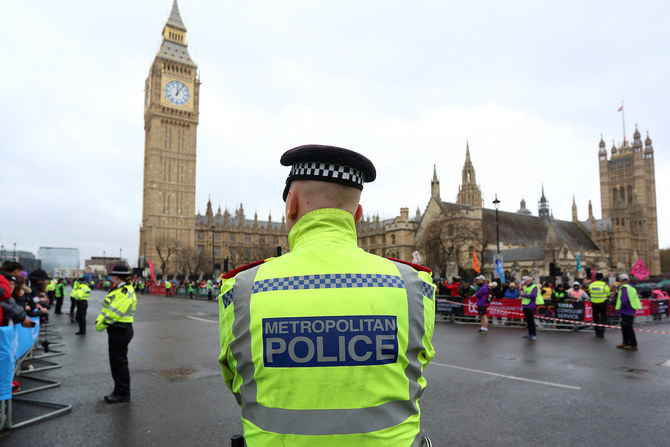
- Adil pleaded guilty in Westminster Magistrates’ Court to two counts of publishing an image in support of a proscribed organization in violation of the Terrorism Act
- Two other police officers who were concerned by the images reported Adil to superiors
LONDON: A British police officer pleaded guilty Thursday to terror charges for showing support on social media for Hamas, which is designated a terror group and banned in the UK.
West Yorkshire constable Mohammed Adil admitted sharing two images on WhatsApp supporting the group three weeks after Hamas and other Palestinian militants stormed into Israel on Oct. 7 and killed about 1,200 people and seized some 250 hostages.
Adil, 26, pleaded guilty in Westminster Magistrates’ Court to two counts of publishing an image in support of a proscribed organization in violation of the Terrorism Act.
In messages shared on WhatsApp stories with nearly 1,100 contacts, Adil posted images of a fighter wearing a Hamas headband, prosecutor Bridget Fitzpatrick said.
“Today is the time for the Palestinian people to rise, set their paths straight and establish an independent Palestinian state,” an Oct. 31 post said, apparently quoting the leader of Hamas’ military wing.
A second post on Nov. 4 was said to quote a Hamas military spokesperson.
Two other police officers who were concerned by the images reported Adil to superiors, Fitzpatrick said. He was arrested in November and has been suspended from the force.
“I accept that at the time of the offending you were of good character,” Chief magistrate Paul Goldspring told Adil, though he said he may impose a prison term when he is sentenced June 4.
Adil was released on bail.
California police move in to dismantle pro-Palestinian protest camp at UCLA

- The pre-dawn police crackdown at UCLA marked the latest flashpoint for mounting tensions on US college campuses
- Live TV footage showed about six protesters under arrest
LOS ANGELES: Hundreds of helmeted police muscled their way into a central plaza of the University of California at Los Angeles early on Thursday to dismantle a pro-Palestinian protest camp attacked the previous night by pro-Israel supporters.
The pre-dawn police crackdown at UCLA marked the latest flashpoint for mounting tensions on US college campuses, where protests over Israel’s conduct of the war in Gaza have led to student clashes with each other and law enforcement.
Live TV footage showed about six protesters under arrest, kneeling on the ground, their hands bound behind their backs with zip-ties.
Dozens of loud explosions were heard during the clash from flash-bang charges, or stun grenades, fired by police.
Demonstrators, some carrying makeshift shields and umbrellas, sought to block the officers’ advance by their sheer numbers, while shouting, “push them back” and flashing bright lights in the eyes of the police. Others on the opposite side of the camp gave up quickly, and were seen walking away with their hands over their heads under police escort.
Around sunset on Wednesday, officers in tactical gear had begun filing onto the UCLA campus and taking up positions adjacent to a complex of tents occupied by throngs of demonstrators, live footage from the scene showed.
Local television station KABC-TV estimated 300 to 500 protesters were hunkered down inside the camp, while around 2,000 more had gathered outside the barricades in support.
But the assembled police stood by on the periphery for hours before finally starting to force their way into the encampment around 3:15 a.m. PDT (1015 GMT), tearing down barricades and arresting occupants who refused to leave. The raid was led by a phalanx of California Highway Patrol officers carrying shields and batons.
Some of the protesters had been seen donning hard hats, goggles and respirator masks in anticipation of the siege a day after the university declared the encampment unlawful.
Prior to moving in, police urged demonstrators in repeated loudspeaker announcements to clear the protest zone, which occupied a plaza about the size of a football field between the landmark twin-tower auditorium Royce Hall and the main undergraduate library.
An initial group of Los Angeles police officers who briefly entered a corner of the camp were overwhelmed by demonstrators and forced to retreat, before reinforcements arrived by the busload about an hour later.
Violent clash precedes crackdown
UCLA had canceled classes for the day on Wednesday following a violent clash between the encampment’s occupants and a group of masked counter-demonstrators who mounted a surprise assault late Tuesday night on the tent city.
The occupants of the outdoor protest camp, set up last week, had remained mostly peaceful before the melee, in which both sides traded blows and doused each other with pepper spray.
Members of the pro-Palestinian group said fireworks were thrown at them and they were beaten with bats and sticks. University officials blamed the disturbance on “instigators” and vowed an investigation.
The confrontation went on for two or three hours into early Wednesday morning before police restored order. A spokesperson for California Governor Gavin Newsom later criticized the “limited and delayed campus law enforcement response” to the unrest as “unacceptable.”
As the much-expanded police force entered the campus on Wednesday night to clear the encampment, some of the protesters were heard yelling at them, “Where were you yesterday?“
Taylor Gee, a 30-year old pro-Palestinian protester and UCLA law student, said the police action felt “especially galling” to many protesters given the slow police response a night earlier.
“For them to come out the next night to remove us from the encampment, it doesn’t make any sense, but it also makes all the sense in the world.”
Protests at schools across the US
UCLA officials said the campus, which enrolls nearly 52,000 students, including undergraduates and graduate scholars, would remain shuttered except for limited operations on Thursday and Friday.
The protests follow the Oct. 7 attack on southern Israel by Hamas militants from the Gaza Strip and the ensuing Israeli offensive on the Palestinian enclave.
Students have rallied or set up tent encampments at dozens of schools across the US in recent days, calling for an immediate ceasefire in Gaza and demanding schools divest from companies that support Israel’s government. Many of the schools have called in police to quell the protests.
The demonstrations across the country have been met with counter-protesters accusing them of fomenting anti-Jewish hatred. The pro-Palestinian side, including Jews opposed to Israeli actions in Gaza, say they are being unfairly branded as antisemitic for criticizing Israel’s government and expressing support for human rights.
The issue has taken on political overtones in the run-up to the US presidential election in November, with Republicans accusing some university administrators of turning a blind eye to antisemitic rhetoric and harassment.
Wednesday night’s police action came a day after police in New York City arrested pro-Palestinian activists who occupied a building at Columbia University and removed a tent city from the campus of the Ivy League school.
Police arrested a total of about 300 people at Columbia and City College of New York, Mayor Eric Adams said. Many of those arrested were charged with trespassing and criminal mischief.
The clashes at UCLA and in New York were part of the biggest outpouring of US student activism since the anti-racism rallies and marches of 2020.
Ninety pro-Palestinian demonstrators — students and outsiders — were arrested at Dartmouth University in New Hampshire on Wednesday, the Hanover Police Department said. They were charged with criminal trespass and resisting arrest.
Indonesia explores opportunities in Suez Canal Economic Zone

- Egypt is Indonesia’s top trade partner in the North African region
- Indonesia has lately been increasing trade engagement with Egypt
JAKARTA: Indonesia is setting its sights on cooperation with the Suez Canal Economic Zone, authorities have said after a series of ministerial-level meetings in Cairo this week.
An Indonesian delegation led by Deputy Trade Minister Jerry Sambuaga met with officials from the Suez Canal Economic Zone on Sunday to explore opportunities, as Jakarta seeks to boost exports through the vital waterway that is the shortest route between Asia and Europe.
Closer cooperation with the Suez Canal Economic Zone would help Indonesia boost its exports to Egypt, as well as other parts of Africa, the Middle East, Europe and Central Asia, Sambuaga said.
“This is in keeping with the fact that more than 8 percent of global trade goes through the Suez Canal annually … We hope that in the future, Indonesia and Egypt will have stronger cooperation and we will see an increase in the export of Indonesian goods to Egypt,” the minister added.
Southeast Asia’s biggest economy has been increasing its trade engagement with Egypt, which it sees as a gateway for exports to other African countries.
Sambuaga’s trip to Cairo followed the visit of Trade Minister Zulkifli Hasan just last year, when he signed a memorandum of understanding with Egyptian Minister of Trade and Industry Ahmed Samir to form a joint trade committee to boost commercial relations.
Earlier in March, Indonesia worked alongside Malaysia to explore the possibilities of a free trade pact between the Association of Southeast Asian Nations and Egypt.
Egypt ranks third among Indonesia’s top export destinations in the Middle East and North Africa, just after the UAE and Saudi Arabia.
With bilateral trade volume worth around $1.58 billion in 2023, Egypt is Indonesia’s top trade partner in North Africa alone. Palm oil, coffee beans, and coconut oil are some of Indonesia’s main exports to Egypt.
India, UAE mark two years of free trade with 16% growth
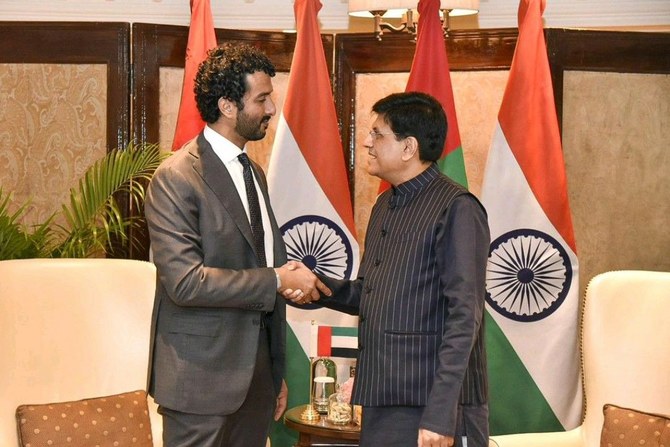
- Technology, innovation, and energy are main drivers behind the growth
- UAE ambassador welcomes increase in trade as ‘resounding success story’
NEW DELHI: A broad trade and investment pact signed by India and the UAE two years ago has boosted bilateral trade by 16 percent, with India’s top business body seeing growth, especially in the innovation, energy and technology sectors.
The Comprehensive Economic Partnership Agreement was signed by India’s Commerce and Industry Minister Piyush Goyal and UAE Economy Minister Abdulla bin Touq Al-Marri in February 2022.
It has been in effect since May 1, 2022, reducing tariffs on about 80 percent of all goods and providing zero-duty access to 90 percent of Indian exports.
The pact has since significantly advanced bilateral exchanges, as they registered a year-on-year increase of more than 16 percent, according to data from the Federation of Indian Chambers of Commerce and Industry, India’s largest and oldest trade association.
“In the first two years of CEPA’s operation, trade between the two countries has grown remarkably by 16.41 percent, showing an increase of total trade from $72.87 billion in 2021-2022 to $84.84 billion in 2022-2023,” FICCI Secretary-General S.K. Pathak told Arab News.
“Most of this growth has been registered in energy, infrastructure and construction, technology and innovation, pharma and healthcare, tourism and cultural exchanges.”
The agreement made the UAE emerge as India’s key partner in the Gulf Cooperation Council region, with both countries expecting to increase the total value of bilateral trade in non-petroleum products to over $100 billion and trade in services to $15 billion by 2030.
Citing the “growing importance of the trade relations between the two countries,” Pathak said the FICCI had “set up an office in Dubai to work closely with industry and government and support business to achieve the full benefits of CEPA.”
Supported by the UAE and Indian governments, the UAE-India CEPA Council was also established earlier this year to enhance investment, trade ties, and the implementation of the pact’s rules.
The UAE Embassy in India celebrated the second anniversary of the agreement with members of the business community in Mumbai, India’s financial hub.
UAE Ambassador Abdulnasser Al-Shaali welcomed the growth in bilateral commercial exchanges as a “resounding success story,” solidifying the long-standing economic ties between the two countries.
“Over the past two years, we have witnessed remarkable growth in bilateral trade, a testament to the immense potential that exists when our complementary strengths are harnessed effectively,” he said during the event on Wednesday.
“The CEPA has not only opened new avenues for businesses to benefit from the bilateral partnership but has also fostered deeper integration of our economies, paving the way for increased investment flows and collaboration across diverse sectors.”
London mayor accuses MP of ‘Islamophobia and anti-Muslim hatred’

- Lee Anderson recorded claiming Sadiq Khan ‘hates this country ... our heritage, our culture’
- Anderson claims he received support from Cabinet ministers after saying Khan controlled by ‘Islamists’
LONDON: The “Islamophobia and anti-Muslim hatred” of Reform UK MP Lee Anderson is “fuelling hate crime and violent threats,” London Mayor Sadiq Khan has said in a statement.
His comments come after ITV News released a secret recording of Anderson talking to party members at an event in which he claimed Khan “hates this country ... our heritage, our culture.”
The news also follows revelations ahead of the London mayoral elections on Thursday that Conservative candidate Susan Hall has followed social media pages and groups in which other people allegedly posted racist content and abuse aimed at the Muslim mayor.
Anderson was previously deputy chair of the Conservatives, but switched parties after he was suspended by Prime Minister Rishi Sunak for claiming that Khan was under the control of “Islamists” and had “given our capital city away to his mates.”
In the ITV recording, Anderson is heard saying former Conservative colleagues had offered him support and sympathy for his words, saying senior party officials had told him “you’re saying what millions of people are thinking up and down the country.”
While not naming anyone specifically, Anderson said: “At least two Cabinet ministers contacted me to say I’d been treated poorly.”
He added: “I would never betray the confidence of my colleagues, regardless of what political party they’re in, that was sent in confidence. A lot of those people who I sit opposite are still my friends.”
Khan said: “In the past 24 hours we have seen my Tory (Conservative) mayoral opponent endorsing Facebook groups rife with antisemitism, Islamophobia and death threats against me. And now we have a former Tory party deputy chair caught on camera being racist.
“It is deeply depressing that he confirms his Islamophobia and anti-Muslim hatred was cheered on by current Tory party staff, MPs and Cabinet ministers.”
Khan added: “It’s unpatriotic to talk down modern, diverse, brilliant Britain in this way. And it has real-world consequences, fuelling hate crime and violent threats.”



